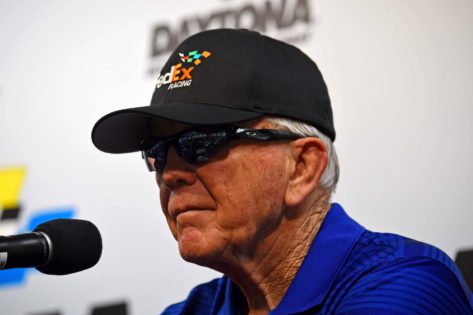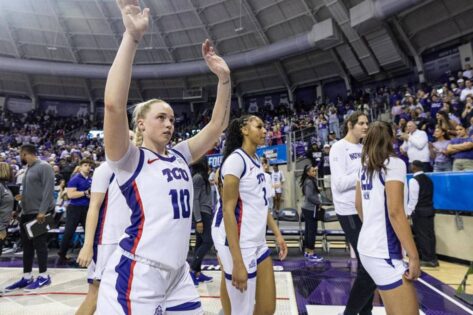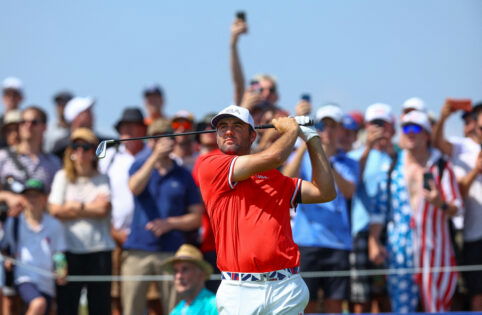“I’m just a simple country boy that has made it big,” as Dale Earnhardt Sr. once said. Pursuing NASCAR can elevate someone from modest roots to national prominence. Reflecting how passion and perseverance could propel a racer from local tracks to superstar status. Early drivers often came from humble backgrounds, working on family cars or at service stations, and embraced risk without fear. Earnhardt also observed, “You’ve got to be willing to take the hit and make the sacrifice,” underscoring the fearless mindset prevalent in NASCAR’s formative years.
This sacrifice led to national fame for Dale Earnhardt. Seven championships, brands flocking to put his face on their merchandise, and a personality that everyone envied. Fast forward to 2025, and NASCAR is sorely lacking a superstar of this magnitude. And while the sport hunts for its next poster boy, Christopehr Bell feels NASCAR’s sponsors need to take the first step.
Christopher Bell is seeking 2000s-style marketing
In past decades, sponsors and NASCAR made faces like Jeff Gordon’s ubiquitous. Dale Earnhardt was the ambassador for Coca-Cola, while Jeff Gordon appeared on Pepsi machines in stores, cereal boxes, and national ads, elevating him to crossover fame. Fans could name drivers readily, fostering personal connections beyond the racetrack. That driver-focused marketing turned humble racers into celebrities, inspiring new fans to follow or pursue racing themselves. Now, Christopher Bell feels NASCAR and the sponsors must take this step to revive their popularity.
Jeff Gluck asked Christopher Bell what NASCAR must do to regain wide popularity on his 12 Questions series. Bell replied, “We/they need to get back to marketing the drivers more. As a kid growing up, you saw the drivers everywhere…I remember seeing, like, Coke machines, and I’m pretty sure Pepsi (had) Jeff Gordon on machines everywhere, like inside Walmart and Lowe’s, and Home Depot.”
Today’s drivers often lack broad visibility, and Bell’s observation highlights a shift. Modern sponsorship deals tend to emphasize team and sponsor branding over individual driver personalities, and digital platforms scatter attention. Unlike the era when Dale Earnhardt Jr. merchandise flew off shelves and Jeff Gordon commercials aired nationally, many emerging drivers remain relatively unknown outside core fan circles. This contrast matters. When fans can’t identify new drivers with iconic brands, engagement and loyalty can wane. Bell’s plea on 12 Questions by Jeff Gluck, “Nobody really knows who the newer generation of drivers are. The sponsors included, they need to start pushing their drivers more to get their faces out to the public.”
ATLANTA, GA – FEBRUARY 22: Christopher Bell 20 Joe Gibbs Racing DEWALT Toyota looks on during qualifying for the running of the NASCAR, Motorsport, USA Cup Series Ambetter Health 400 on February 22, 2025, at Atlanta Motor Speedway in Hampton, GA. Photo by Jeffrey Vest/Icon Sportswire AUTO: FEB 22 NASCAR Cup Series Ambetter Health 400 EDITORIAL USE ONLY Icon250222194
Backed by partners like Roger Penske (Team Penske owner) or Rick Hendrick (Hendrick Motorsports owner), alongside sponsors such as John Menard Jr.’s Menards and Michael Jordan’s 23XI Racing, NASCAR can tap extensive marketing networks, dealership events, retail promotions, and multimedia campaigns to elevate driver visibility and rebuild the personal connections. Bell feels they need to start pushing their drivers more to get their faces out to the public, reflecting evidence that marketing the human element is crucial to reviving wider interest.
Now, while Christopher Bell feels that NASCAR needs to give drivers more of the spotlight, Mark Martin believes that the drivers simply don’t show enough personality to build such a brand.
Mark Martin on modern era drivers
Mark Martin had a long and fruitful career and came from an era of NASCAR where the sport was growing at every turn. From Richard Petty’s dominance being carried on by Dale Earnhardt’s rivalry with Darrell Waltrip, to Jeff Gordon’s arrival on the scene as a 24-year-old championship winner, NASCAR looked in safe hands. However, such rivalries and personalities are sorely missing from the sport, and Mark Martin is not pleased.
Martin feels that ever since the sport got eyeballs on it, drivers stopped showing out and have kept to themselves, despite having captivating personalities. While Christopher Bell’s comments reflect a lack of opportunities to put the driver’s brand on a global stage, Martin believes that they need to show the fans that they have that marketable image first. He told Kenny Wallace on the Kenny Conversation, “There doesn’t seem like there’s enough super high rivalry. First of all, you had to water down the personalities, and that hasn’t helped. I truly believe that the drivers today are not nearly as vanilla as they appear to be.”
Only a select few drivers like Joey Logano, Denny Hamlin, and Kyle Busch, veterans of the sport, really show their fiery side when they don’t like something, or even just embrace the crowd. The younger guys? They keep to themselves, for the most part, and this has been a trend in the sport which started in the 2000s, according to Martin. He added, “I’ll guarantee you, Jimmie Johnson was not [vanilla]. In fact, Jimmie Johnson was one hell of a character, but he never showed that because of the commercialism of the sport. That has stopped the next generation from emerging as big superheroes.”
The three veterans mentioned earlier all have their faces stamped outside of NASCAR. Joey Logano recently appeared on First Take on ESPN, and Denny Hamlin and Kyle Busch have been seen at WWE events. So, while Christopher Bell’s plea to NASCAR is as real as it gets, the current crop of drivers needs to show the sport that they are more than the car they drive, according to Martin, who believes they are well and truly capable of doing so.
The post JGR Driver Makes a Plea to NASCAR’s Billionaire Partners, Charting a Path to Past Glory appeared first on EssentiallySports.



